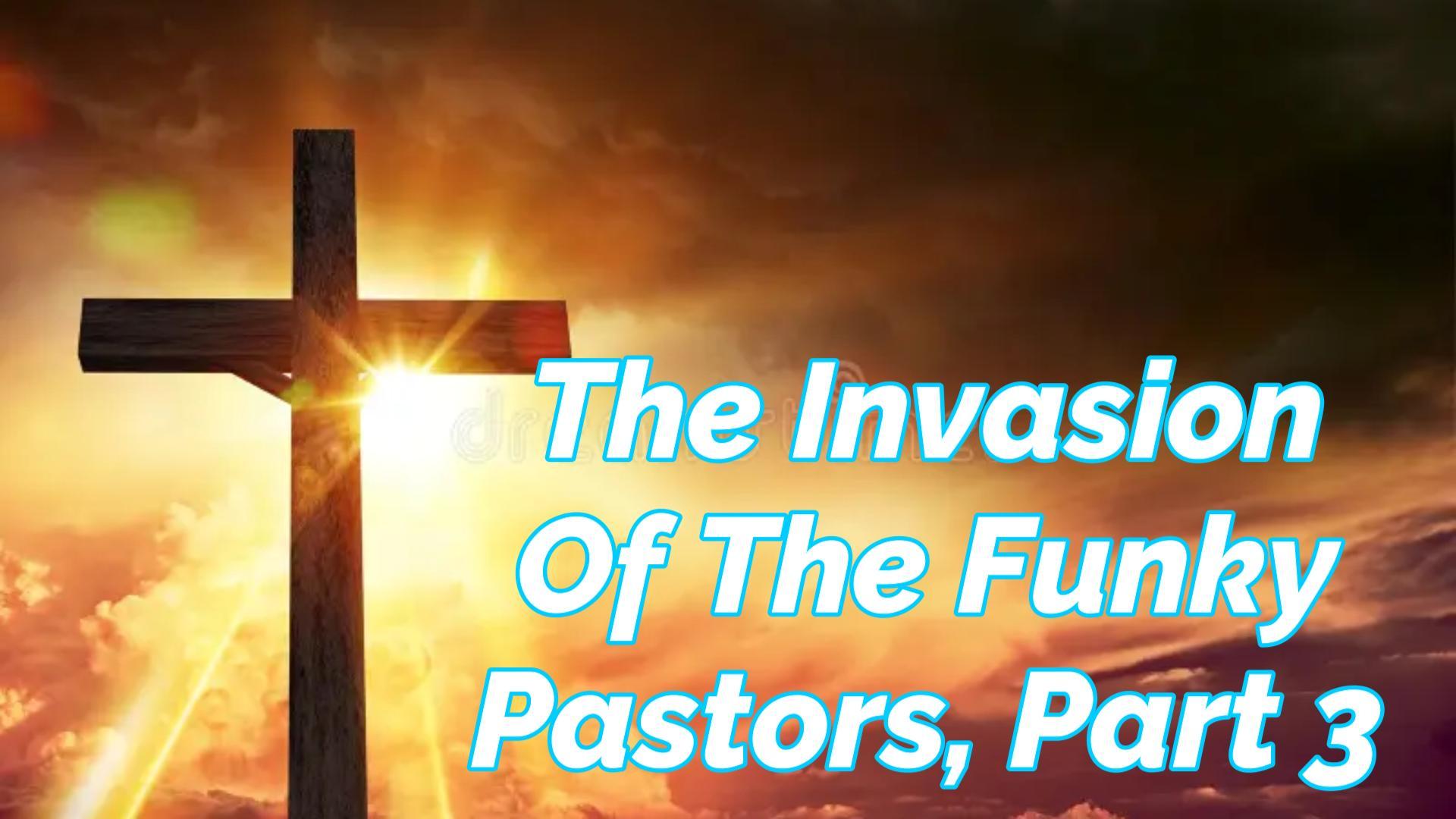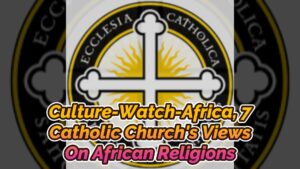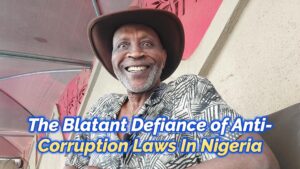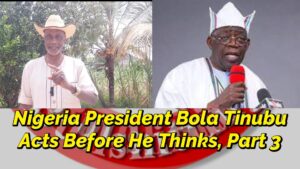NOTE: This was blog uploaded here recently because this is a new site. However, it was first published on other platforms in 2015. The situation described then in this introductory piece, and in the rest of the entire series about the depravity in contemporary Nigerian Christianity, remains the same, and even getting worse by the day.
Greetings! I am Harry Agina, and this is “No Bullshitting” Social Critic. This is the third in my “Overview Introduction” to the series of excerpts of the soon-to-be-controversial book that is titled “The Invasion Of The Funky Pastors, and subtitled “Church Business At War With The African Culture.” I will refer to the secondary theme of the book, as I address the legitimacy of all the cultures of the world, and the negative impact of misguided born-again Christianity on the African culture. Note that I say ‘misguided Christianity,’ and not Christianity as a whole! I will start with broad overview of the global concept or notion called culture.
Once upon a time, the entire world was dominated by one culture, and that’s the European Culture. In the words of renowned African American intellectual, founder of “Afro-centric Philosophical Movement,” Molefi Kete Asante, PhD, “Humanism itself was frequently nothing more than a Euro-centric concept of what was good for the world.” That was then, and this is now. The world is better informed now, and intercultural tolerance is rife; no wonder, a black man named Barrack Obama is presently in the White House in the USA!!!
I am quite aware that many people that will get to read this do not need a lecture from me on the definition of culture. However, the campaign against ignorant Christianity in relation to the African Culture is not meant for the intellectual elites alone; indeed, it is actually geared mainly towards enlightening the less intellectual grassroots communities in our villages in Africa, who I call the real custodians of our culture. And if we want to convince the grassroots custodians to do a good job of nurturing, protecting and preserving our culture, then they must understand the essence of authentic cultural identity of Africa in the larger global community. Hence, any message on the subject has to be very simple in the interest of effective communication. It is imperative, therefore, to start with a few functional definitions of culture.
Culture may be defined in a simple form as a set of traditions that are unique to a group of people in a society, which set them apart from other groups. It can also be defined as the ‘Way of Life’ of a group of people in a society. The theory of culture is a little more complex, however, when we talk about culture-within-culture, otherwise known as sub-cultures.
It could actually be said to start with the basic individual ‘ways of life’ that make one person unique from the next person. Then we take it to the next level of family culture that binds a family together, differentiating its members from the next family in the community. Next up, there is the community culture, which sets one community apart from the next community within an ethnic group. And, of course, every ethnic group within a country is different from the next one in many ways, because each has unique ways of life called culture, made up of peculiar traditions or customs.
And then, there is the culture of a country, in this case Nigeria, which sets us apart from Ghana and the other nations in West Africa. Specifying West Africa is to say that there are certain traits that you find to be common among West African nations, which set them apart from people of other regions of Africa. Then, finally, we have the African Culture, being special ways of life that are commonly found among Africans, making us distinctly different from Americans, Asians, Indians, and people from the other regions of the world.
When two different cultures meet in our contemporary world, there are acceptable rules of engagement, or principles that guide their interaction. The rules include mutual respect between the interacting cultures, and this is based on the notion that all cultures of the world are legitimate. The mutual respect begets mutual tolerance, and, the differences between the interacting cultures are seen as reasons for celebration, and not reasons to quarrel or disagree. In other words, it is recognized that there is beauty in cultural diversity. This was not the situation when the European race met with the African race for the first time so many years ago. Their meeting was the classical case of intercultural interaction gone badly!
The culprit of that classical error was ‘Mr. Ignorance,’ who is the cousin of ‘Mr. No-information.” When two cultures meet for the first time, the level of success of their interaction is partly determined by the information that each culture has about the other. This is where ‘Mr. Language,’ a son of ‘Mr. Communication,’ comes into play. When the white man and the black man met for the first time, they could not communicate, because their languages were a world apart. Based on this, a bunch of assumptions were made by each party about the other in that initial meeting, which determined the nature of the intercultural interaction between the two races.
The white man could not understand the language of the black man, and vice-versa; hence, each party believed that the other was not human. Unfortunately for the black man, his belief did not really matter; the white man was more powerful in many ways. Importantly, the white man was more ‘vocal’ in the global community, so, his views during that crucial initial encounter prevailed. The gist of it all is that the European race erroneously concluded that God intended the black race to be slaves; that blacks (Africans) were less than human. And, of course, if Africans were perceived as less than human, then there was absolutely no reason for the white man to believe that the African Culture was legitimate. That was the beginning of the demonization of the African Culture in its entirety!
That, also, was the Old World Order. Fortunately for Africa and the other “less privileged” cultures, God Almighty built the world around the phenomenon called Change. The wind of change is forever blowing, and continuously turning the world and humanity from one era to another as we grow in knowledge. For humanity, the change is most often about our Belief System. In other words, God’s intentions or design for humanity has never, and will never change! Rather, it is our understanding of those intentions that constantly changes. For instance, we once believed that the world was a flat object; now we know better; or, do we? Well, at least we do believe now that the world is spherical. Yet, the man that discovered this present fact was actually accused of “blasphemy” and executed when he revealed it; the same way that so many Africans died in slavery simply because other people believed that Africans were less than human. And, guess what—the white man actually often quoted the holy bible to justify his erroneous belief that the black man was subhuman. There are so many other examples of errors made by humanity based on wrong beliefs. This is enough reason for every human to leave an open mind about anything that we know as fact today, because facts are subject to change in the face of superior arguments or evidence.
Today, there is a New World Information Order, which has rubbished many of the beliefs of the Old Order, because we are now better informed about the world and human nature. My interest in this treatise is our better understanding of Humanity and Culture, in relation to religion, especially Christianity. In the New Order, Humanism is no longer a Eurocentric view of the world; all humans are now accepted to be equal in the eye of our creator. No wonder an African, Barrack Obama, is now in ‘The White House’ as the president of America, the greatest nation on earth; the same nation that had championed the Old-Order notion that blacks were sub-human. It is now a global consensus that all cultures of the world are equally legitimate, including religion; none is superior to the other, period! It is also a global consensus that none of the innumerable cultures of the world is pure or perfect. This is also true about religions. They are all flawed in various ways because we are all human, and anything human has faults, with no exception whatsoever. Therefore, there is one global consensus verdict on the culture of every society, be it village, country, or continent—Purify the culture; Don’t Destroy it! This is based on the welcomed notion that there is beauty, and there is unquantifiable positive value in cultural diversity. Have you ever tried to imagine how boring the world would be if all the peoples of the world looked, spoke, and behaved exactly alike? I don’t know about you, but I don’t even want to imagine it!!!
Not so long ago, opinion leaders of the African American community commenced a double-sided Herculean battle within the mainstream contemporary American campaign for new world information order. The new order seeks to make the African Culture relevant in the global scheme of things, starting with America. On one side of the African American campaign, the opinion leaders aimed to change the negative attitudes of the white, the Asian, the Hispanic and other outside communities towards the African people. Beyond this, however, the African American leaders also had to deal with the internal problem of convincing African American youths that their African heritage was worth being proud of. This internal campaign was imperative, because there were too many African American youths who, haven been bombarded with so much negative information about Africa, had gotten so disenchanted with the continent, that they denounced and renounced it as their heritage. Many insisted that they were black Americans, and not African Americans. In fact, they were ready to fight anyone who associated them with Africa. I should know; I had more than one fight of my own as recent as the 1970s and early 1980s in Houston, Texas, for telling some African Americans that they could not escape being African.
However, a sudden remarkable wind of change began to sweep across America not very long after the commencement of the massive global campaign for improved intercultural interaction in the 1980s. The general idea was to establish and promote the notion that all cultures of the world are legitimate, and each is relevant in the global scheme of things. Notable African Americans led the campaign from the Afro-centric perspective, and pursued it through their various personal experiences. Speaking of the people that I have personally encountered on this subject, very popular Baptist Minister, Reverend William (Bill) Lawson immediately comes to mind. So does Social Activist, Mr. DeLoyd Parker, founder of SHAPE Community Center in Houston, Texas. SHAPE is acronym for “Self Help for African People through Education.” And, of course, I would not forget Molefi Kete Asante, PhD, founder of Afrocentric Philosophical Movement (APM), who I spent a couple of hours with on the subject, and I enjoyed every bit of it. Dr. Asante is widely acclaimed to be in the top-five list of the most intellectual African Americans. He is a world acclaimed educator, and a world-renowned expert in the fields of Communication Studies, African American Studies, and African Studies. Incidentally, Molefi has been leading by example in the Afro-centricity campaign. Haven traced his ancestry to Ghana in West Africa in the 1960s; he dropped his English “slave” names (Arthur Lee Smith, Jr.) and adopted the Ghanaian names, Molefi Kete Asante.
Fundamentally, Molefi and his APM argue that it is time for “Afrocentric Enquiry Into Encounters;” that the world must begin to seriously consider African points of view in every global topical issue. This ‘New World Information Order’ argument basically negates the old ways that upheld a Euro-centric view of the world, which fostered the notion that the European culture was superior to all the other cultures of the world. The new campaign maintains that the notion of superiority of one culture over another is no longer tenable in the modern, better-informed world.
It was a great delight and honor to me as a young man way back then when I sat for over two hours and shared views with Molefi on this subject. Our discussion happened just a couple of years after his historical presentation in August 1979, at the “Bellagio International Conference On Black Communication.” His presentation became instrumental in UNESCO’s campaign for the New World Information Order. Titled “International Communication: An Afro-centric Inquiry Into Encounters,” Asante’s presentation basically condemned the “fallacy” of the old notion that anything that was not European, or consistent with European ways of life was wrong, bad or evil. In particular, Dr. Asante’s piece frowned at the categorical condemnation of traditional African religions, names, and other Afrocultural elements.
“The Zulu believe that they are the people of heaven,” Asante argues, “The Jews have contended that they are the chosen people; the Chinese say that they are in the middle kingdom of the earth; the Yoruba people of Africa believe that they were made a great people by the divine king, Oduduwa; and the Ashanti people say that a Golden Stool descended from the sky to firmly establish the Ashanti nation. Intercultural communication cannot effectively occur without regard to beliefs such as these.” According to Asante’s argument, the major differences in belief systems between the various peoples of the world, which are based on differences in cultural experiences, can no longer be ignored or underplayed.
It is clear that the campaign has caught on; intercultural tolerance and appreciation has improved quite remarkably since my first arrival on the soil of the USA in the 1970s. In recent times, Africa, as well as all the other cultures of the world, has clearly witnessed remarkable increased equity in cultural exchange during encounters.
It is apparent that the global intercultural awareness campaign has not been a waste of effort after all. Americans, for instance, have gradually become more open to other cultures of the world. More Americans are now aware that the world does not begin and end in America, and they are more tolerant of the other cultures of the world. The intercultural improvement is also very apparent in many parts of the world. The manifestation of the new trend is apparent in the streets of New York, London, and Paris, to name just three western cities. African art, fashion, and music are suddenly in vogue in the western markets.
People of various races are seen dressed in African fabrics and African fashion designs all over the place. It has even become fashionable to be an African in the United States. Even the Chinese are now more tolerant of black people, a far cry from their openly confessed hatred of the black man in the recent past.
There is only one big problem in my preceding scenario of New-World-Order in inter-cultural interaction. The problem is the Africans in Africa! Yes indeed; we are now our own worst enemies. We are supposed to feel good that the world has finally agreed that our culture, and we as a race, are legitimate. Rather, the more the rest of the world embraces our culture, the more we reject it. The contemporary white man is telling us that he now knows that his forefather was in error to say that the African Culture was illegitimate; but some of us are saying that the contemporary white man is wrong. What irony! We are virtually insisting that the 17th century white man who conceived that our culture was illegitimate, indeed, that we were not up to human, was correct. We believe that we must destroy our ways of life and behave like white people, or Chinese, maybe Indians, anything but African. Many of us are doing it in the name of Christ, and this is my focus. We claim that we have seen ‘The Light,’ and the light reveals that the African traditions, principles, and cultural artifacts are all evil. The light in question, if you ask them, is the word of God according to the teachings of Christ.
My basic argument here is that whosoever believes that Christ taught against, or the bible condemns Culture, is very misinformed, and I really don’t give a hoot who or what that person is. The person has a warped interpretation of the Holy Bible, and he grossly misunderstands the teachings of Christ. We are erroneously equating our entire culture to “idol worship”! Christ couldn’t have taught against cultural traditions; no society exists without sets of traditions and principles, which we call culture. Even ants and wild animals have traditions in their kingdoms! In fact, Christ did attend some cultural events, such as the annual Jewish Passover festival. He actually encouraged traditional events; otherwise he would not perform his first miracle of turning water into wine to support a traditional marriage ceremony at Cana in Galilee (John Chapter 2). Naturally, Christ did condemn some bad traditions, and faulted the mode of the application of others, without condemning them in entirety. So, it is really all about good and bad that exist in everything that is human. It is also about the reformist capacity to separate and eliminate the bad from the whole; then retain, nurture, and promote the good.
Our forefathers were guided by sets of Afro-Cultural traditions, which have defined and distinguished us as the people of Africa. They did not envisage our society to be turned into one with European or American ways of life. We owe our fathers, our forefathers, ourselves, and the coming generations a duty to preserve a refined version of those traditions that were handed down to us, and hand them down to the generations after us. This is what all peoples of the world are doing today, apparently with the exception of Africans, particularly Nigerians.
I must emphasize that mine is a reformist campaign; I am only arguing for the preservation of the good traditions in the African Culture, and definitely not the bad ones. We must learn to practice the message and wisdom of the ‘baby-and-dirty-bath-water’ adage: we bathe our baby, pick it up from the dirty bath water, throw away the dirty bath water, and then keep and nurture our baby. We eliminate the bad or outdated traditions and nurture the culture. Too many of us are too enlightened in this age to allow ourselves to behave like fools that throw their babies away with the dirty bath water. This, of course, is to affirm that the African Culture is basically a good baby, a little dirty, that’s for sure, but our cherished baby all the same, just like every other culture of the world. And so, what we must do, which other peoples of the world are doing, is to refine the African Culture; modify or completely throw away all the negative traditions, and retain the good ones, in service to the Almighty God of variety.
This is a good place to bring in a few more diverse definitions of culture by anthropologists, theologians, and other scholars, some of whom have approached it from Christian perspectives. Let’s start with T. S. Eliot, who wrote in his 1949 text, Christianity and Culture: “Culture may be described simply as that which makes life worth living.” Emil Brunner, a theologian, stated in his 1948 text, Christianity and Civilization: “Culture is materialization of meaning.” Another theologian, Donald Bloesch, stated that culture is “the task appointed to humans to realize their destiny in the world, in service to the glory of God.” Later, in 1966, an anthropologist, E. Adamson Hoebel’s text, “Anthropology: The Study of Man,” said that culture “is the integrated system of learned behavior patterns which are characteristic of the members of a society and which are not the result of biological inheritance.”
“All of these definitions can be combined to include the world views, actions, and products of a given community of people,” summed Jerry Solomon (theologian) in his 1995 text titled “Christianity And Culture.” In Christ and Culture in Dialogue, Angus J. L. Menuge said, “It is impossible in practice to separate oneself from culture; as culture permeates our thinking and language, it is as much in us as it is around us. We may keep out some bad influences of culture but others will remain inside.”
Far back in 1913, J. Gresham Machen (1881-1937) posed the key question in the controversy: “Are Christianity and culture in a conflict that is to be settled only by the destruction of one or the other of the contending forces?” He followed with a response to his own question: “A third solution, fortunately, is possible-namely consecration. Instead of destroying the arts and sciences, or being indifferent to them, let us cultivate them with all the enthusiasm of the humanist, but at the same time consecrate them to the service of our God.”- The Princeton Theological Review, Vol. 11, 1913.
“That the forest should meet Christian urbanism was the most natural thing in the world,” wrote one of Africa’s pride, Nobel Laureate, Wole Soyinka. “And I think that there were narratives in which the priest himself had to confront, shall we say, the equivalent of what you might call the goblins of the woods. And he had to bring his own Christian powers and negotiate a kind of existence with them.”
A recurrent reformist notion in many of the religion-inclined definitions I have come across is the need to employ culture “in service to the glory of God.” And, the basis, theme, indeed, the entire essence of my argument is that the “bad influences of culture be kept out, and others remain inside” to be consecrated and employed “in service to the glory of God.” In other words, let’s clean up our baby, throw away the dirty bath water, and nurture our baby. We must not annihilate our culture, any culture!
My book posits, and I affirm in this treatise, that Christianity is among the strongest foreign negative impacts on Culture in contemporary Nigeria. Remember, however, that I am talking about Christianity as practiced by a new wave of ignorant, unpatriotic African pastors, and their ‘blind followers.’ In Nigeria, West Africa, the new-wave pastors are grossly misinterpreting the Holy Bible, and attempting to annihilate Africa’s Culture, misguidedly in the name of Christ. Some of them are committing all manner of mischief in the process, and the ultimate name of their game is money. The more successful ones are living like ancient Roman Emperors in outlandish affluence with monies that are emotionally and often diabolically extorted from vulnerable Christians. The pastors make huge money when they sell the idea to their followers that the African Ways of Life are anti-God. Next, the gullible followers are brainwash to believe that they are plagued by “generational curses,” which are associated with the African traditional elements or artifacts. And, of course, the curses have to be lifted with “anointed oil,” “holy water,” and special sanctification prayers by the pastors, all of which cost huge sums of money.
In essence, the funky pastors are propagating the demonization of African religions and other cultural traditions, a notion basically originated largely in the 17th century; even when the architects of the notion have repented about it. In the new world where other peoples of the world are making visible efforts to promote and preserve their cultures, new-wave born-again pastors are urging Africans to do everything possible to annihilate the African Culture. We are gradually but surely transforming ourselves into a people without a culture of our own. We are fast becoming counterfeit versions of European and American Cultures, which we copy and bastardize. It is my sad observation that this ugly trend is most prevalent in Igbo land in Nigeria, West Africa. More sadly, my very own village is a spearhead of the trend. And, most sadly, many of our enlightened brothers and sisters are sitting back and allowing the less enlightened ones to call the shots that are destroying our culture!!!





Your comment is awaiting moderation.
You completed some nice points there. I did a search on the topic and found a good number of persons will consent with your blog.